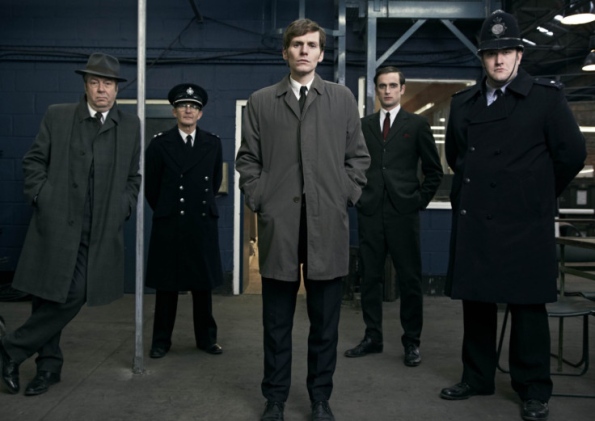
Long-running detective show Inspector Morse, starring John Thaw, ran from 1987 to 2000. Immensely popular in its day, millions followed the escapades of curmudgeonly, intellectual, melancholy Morse. Last year, for the 25th Anniversary, a terrific TV movie, Endeavour, was produced. It seems I wasn’t the only one struck by the wonderful quality, because it’s returned for a series. (This is the second spin-off - the other: Inspector Lewis, starring Thaw’s sidekick Kevin Whately, started in 2007, and ended in 2015.)
This is that series.
I should add that even if you haven’t seen an episode of Morse, it’s easy to follow
and stands on its own. It relies a lot on the mythos surrounding Colin Dexter's detective, but so much is new that it's really a spin-off. There is an independent cast that doesn't require any introduction.
The first
episode, Girl, came out last Sunday:
When a young secretarial student dies suddenly, Endeavour (Shaun Evans) senses there's more to the case than the preliminary medical verdict, heart attack. Now working out of Oxford's Cowley police station, Endeavour has become "bagman" to DI Fred Thursday (Roger Allam). But newly arrived Chief Superintendent Bright (Anton Lesser) has other ideas, and when a respectable doctor is found shot dead in a public lavatory, Endeavour's outlandish theories threaten his career, forcing him to investigate from the sidelines.
Through a puzzling haze of deceit and misdirection, involving an Oxford physicist who worked on the atomic bomb and the fate of a vulnerable single mother, Endeavour is forced to question Thursday's orders and risk his career to avert a family tragedy and solve a pair of violent murders.
Shaun Evans is
simply stunning as Morse. At times the strength of resemblance to John Thaw is
uncanny. Still, he’s certainly his own man. Young Morse is less grumpy and
cynical and more Sherlockian in his deductions. He is still a sucker for a
pretty girl and has little respect for authority, which brings him into conflict
with his boss, Inspector Thursday. And speaking of which, Roger Allam puts in
another marvelous performance as the pipe-smoking, ex-military throwback to the
Golden Age of detection. In a way, it feels like a rite of passage to have
Morse mentored by this figure from another time. Morse, in the 80s and 90s,
detected Golden Age style in a modern world, being one of the very last to do
so. (Lewis has more of the procedural
feel.)
Thursday is
unquestionably one of the best parts of the show. His lifestyle contrasts
sharply with that of the previous mentor figures: Morse and Lewis, who led
melancholy bachelor lives. Thursday (so far) has a happy home life, and what’s
more, an interesting one, unlike Lewis’s blah tossed-off comments on The-Wife-And-Kids.
This refreshingly cheerful solidity is a novel thing on television, and to top
it off, writer Russell Lewis says: “[T]here’s a decency to characters like
DI Fred Thursday. It’s something that I miss about this country – that decency
which seems to have been lost. One’s not trying to bring it back, but we
certainly touch on this inherent decency of the man.” It’s nice to have someone
we can rely on not to have drama every week.
 |
| L to R: Thursday, Bright, Morse, Jakes, Strange |
But to get back
to this particular episode, there are several strong suspect performances,
notably Sophie Stuckey as Pamela Walters, Olivia Grant as Helen Sloan, and
Jonathan Hyde as Sir Edmund Sloan.
The plot, while
sporting good dialogue, suffers from the same over-complexity which afflicts
the later Morse and routine Lewis episodes, hovering somewhere on the edge of
comprehension. The final unveiling reveals an unlikely, uncharacteristic
solution. Still with a bit of suspension of disbelief, these things are
bearable. Like many Morse episodes, the journey was more fun than the
destination.
Overall, a lovely
first installment, and I can’t wait for more.
4/5 Stars
Next week's episode review.
Longish
4/5 Stars
Next week's episode review.
Longish
I've just discovered your blog - love it. Thank you!
ReplyDeleteSorry this was never a BBC franchise ever!!!
ReplyDelete